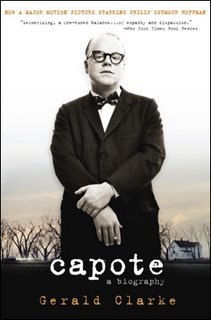
I was so captivated by the movie Capote (even though a mess-up at the theater meant I missed the first five minutes) that I decided to read the book it was based on, Capote by Gerald Clarke. After all, I reasoned, I am writing a biography and I might learn something from the book’s structure and rhythm.
Well, that was an understatement. The book is a marvel, an I-can’t-put-it-down masterpiece of 540 pages, each dripping with delicious and sometimes excruciating details about ruman Capote.
I remember when he died in 1984. By that point Capote was an overweight, pill and alcohol addicted mess, in and out of hospitals. It had been 20 years since the release of In Cold Blood, his masterpiece, so at the time I wasn’t particularly saddened by his death.
But I clearly did not fully appreciate Capote’s brilliance. As Clarke demonstrates, for most of his life Capote was a disciplined, driven writer. While he enjoyed fancy cocktail parties with the glitterati in New York and on the yachts of people like Aristotle Onassis and Marella Agnelli, he spent most of his time holed up in spartan island houses typing away. He was truly dedicated to his craft and was in complete command of his language and style.
His wrote in almost every medium. While he made his mark with short, almost Gothic short stories, his novels, like Breakfast at Tiffany’s, were admired. He wrote travel pieces for Vogue, a much-talked about profile of the reclusive Marlon Brando for The New Yorker, and numerous other articles. Every time he came out with new work, it made a stir.
Of course part of his popularity came from his personality. As Philip Seymour Hoffman so ably demonstrates in the movie, Capote was effeminate and spoke in a high pitched tone. He was also a great listener and soon found that the world’s most social women – Babe Paley, Lee Radziwall, CZ Guest – were devoted to him. All that changed when he published a short story that parodied their lifestyle. He was cast out, decried as a traitor, and that was the start of his downward spiral.
The book highlights an era when writers were a dominant part of American culture, when what they thought, said, and wrote about was eagerly anticipated. There are a few such writers in the country today, but their role, as everyone knows, has been eclipsed by the rise of celebrities in every other form – the movies, the sports fields, the world of music.
As for learning how to write a biography from this book, well, I can only dream. Clarke, a former reporter for Time Magazine, spent almost 10 years in Capote’s company and interviewed hundreds of his friends. He got amazing material and wrote a gripping book with it. Capote spent 13 weeks in 1988 on the New York Times bestseller list – the longest time ever for a literary biography. It has just been reissued in paperback to coincide with the movie. Just as Capote, the movie, is a must-see, Capote the book is a must-read.
No comments:
Post a Comment